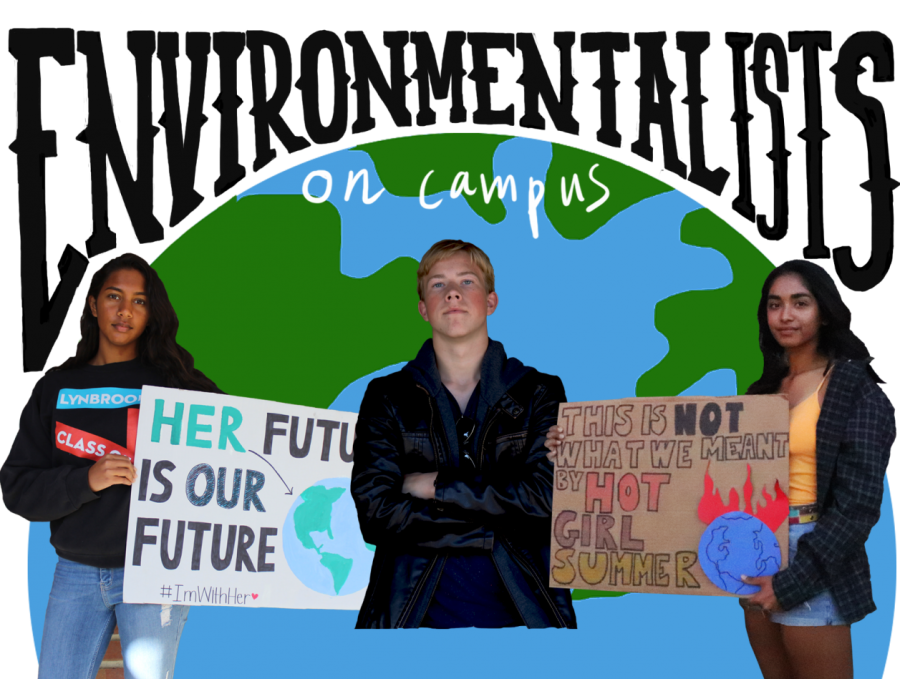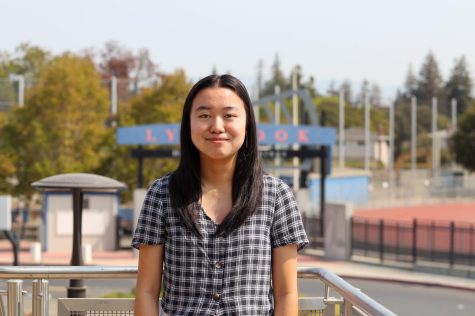Environmentalists on campus
Graphic illustration Jasmine Hou Photos by Medha Upadhyay and Lillian Fu
These three students take action to drive change on environmental issues.
November 5, 2019
In the face of the global climate crisis, people around the world are combating the issue in a variety of ways, from participating in strikes and protests to making smaller changes toward a sustainable lifestyle. Some activists have gained fame through their involvement, such as Greta Thunberg, who has since become the face of teenage activism worldwide. Her unique take on climate change has inspired teenagers around the world to take up the cry. Here on campus, three students take action to drive change on environmental issues.
CHARU VIJAY
Senior Charu Vijay first became involved with environmental activism after participating in a beach cleanup in Belize. Uncovering the origins of the trash that she and other students picked up made her realize how heavily human activity affects the environment.
“If you see a Japanese microwave on the shores of a Belize beach, you realize your impact,” Vijay said. “You use a piece of plastic for ten seconds, but it’s going to be there forever.”
Since then, she has made several lifestyle changes in an attempt to live more sustainably, such as not using plastic straws and bringing a mug to coffee shops. Vijay also began avoiding boba because it was preventing her from reducing her plastic waste consumption.
“After knowing all I did about the environment, it didn’t feel right to use that much plastic or to eat meat when it’s such a simple change,” Vijay said.
In addition, Vijay served on the Saratoga Youth Commission for two terms, where she became part of the initiative working toward making Saratoga a “green” city. To achieve this goal, Saratoga needed to have a certain number of trees planted per resident. Vijay worked with the city to improve their existing program for subsidized tree planting to further incentivize residents to get involved.
“I thought that it would be great if Saratoga made subsiding trees more organized and transparent, because a lot of people own unused land,” Vijay said. “I worked with my commission and the council to figure out a way to make that happen.”
She also attended the climate strike protest in San Francisco on Sept. 20. Attendees marched to Representative Nancy Pelosi’s office to demonstrate the widespread support for legislative action against climate change. Many promoted the Green New Deal, which seeks to address the climate crisis by increasing government investment in clean energy jobs and infrastructure.
Vijay’s experiences have filled her with a passion for environmental science and activism. The growing awareness within the community toward climate-related issues has made her proud of her involvement and the progress of the global movement.
“Sometimes people come up to me and say, ‘Oh, I didn’t use a plastic bag at the grocery store because of you’,” Vijay said. “Seeing that people care through small things like that, then going to the strike and seeing thousands of people who care, it’s really inspiring.”
Vijay encourages potential activists to believe in their individual power and to take on the responsibility of driving change instead of waiting for others to step up.
“When you make choices that are bad for the environment, you are consciously perpetuating the effects of climate change,” Vijay said. “Every person can make a difference when we collectively push for change.”
AEDON SHEETS
Sophomore Aedon Sheets got involved with Volunteers for Outdoor California (V-O-CAL) five years ago through his father, who volunteered with them as well. V-O-CAL is a group that works to build and maintain trails.
“I figured that it would be fun from what I’ve heard about the organization,” Sheets said. “It would be helping things in nature, and building upon pre-existing land to create the trails.”
The group operates from spring to fall. Each weekend, volunteers drive moving trucks filled with tools such as pickaxes and shovels out to the trail on which they are working that week. Then, they camp out in the wilderness and help with whatever work they can, whether by clearing, building or fixing a trail.
“Within the greater Bay Area, national parks and nature reserves have asked us to work on their trails,” Sheets said.
Sheets’ experiences with V-O-CAL have brought him closer to nature. Through his work, he has become more interested in protecting the environment and more conscious of the harm humans can inflict on their surroundings. V-O-CAL was responsible for clearing and repairing trails in many areas devastated by the Camp fires, a series of destructive wildfires that ravaged parts of Northern California. These fires, the deadliest in California history, revealed the sobering reality of human environmental damage to Sheets.
“When we saw the [2018] wildfires, it showed me the potential people have to destroy the environment,” Sheets said. “We went out to build the trails, and all of the trees were burned down. No leaves, just black.”
Sheets believes that both utility companies and people in the community have a responsibility to prevent future fires. California’s wildfire season has both been lengthened and exacerbated by climate change, producing more fires, each more destructive than the last. Therefore, he encourages individuals to not only get involved in local environmental efforts, but also in efforts to combat the climate crisis, and by extension, wildfires. He believes that the community should help support organizations and groups that hold utility companies accountable.
Spending time restoring trails has also influenced Sheets to become more aware of his own resource consumption. He is careful to use no more than he needs, especially of paper-based goods, because they come from the same trees and forests he works to protect.
Sheets recommends that Lynbrook students get involved in a program like V-O-CAL, whether they are already interested in protecting the environment or they do not feel the immediacy of the crisis yet.
“It’s really fun, and you meet really cool people,” Sheets said. “For people who aren’t yet interested: try it. You can still have fun doing these things, and it will also benefit the environment.”
RHEA ANAND
Senior Rhea Anand is a co-founder of For What It’s Earth, a group that aims to educate the community on local and global events related to climate change, as well as lifestyle changes and product alternatives they can implement to live more sustainably. The project also raises money to support the global effort against climate change.
“We chose an environmental focus because we thought there wasn’t enough awareness about it,” Anand said. “If we gave profits to an environmental organization, we’d be able to create more awareness for that cause.”
On the website for their project, Anand and her team sell crafts such as upcycled polaroid bookmarks and friendship bracelets, as well as commissioned items such as painted hydroflasks and jeans. Proceeds from these sales are donated to the Environmental Defense Fund, a prominent nonprofit advocacy group.
They also run a blog on their website where they link articles, give rundowns of major events concerning the climate movement and provide ways for readers to get involved. These include donations, product alternatives and tips to lead a more sustainable life.
“We wrote [a blog post] about the Amazon fire, one about cruelty-free makeup and another about vegan diets,” Anand said. “Things that people might not even think about that have to do with climate change.”
Anand also attended the San Jose Climate Strike on Sept. 20, and was impressed by the number of people in attendance and the broad range of ages in the attendees. Her experience that day influenced her to introduce more climate change related issues in Intersections, a social justice club in which Anand is an officer.
“While all aspects of social justice are important, climate change is the most pressing,” Anand said. “If I can get a new crowd of people to join in on this somehow, then I know I’m making a difference.”
Anand hopes that their project can inspire other community members to take action in preserving the environment themselves.
“We want to give information,” Anand said. “We want to spur something inside people that makes them want to change. By giving people resources, we want to increase awareness.”
Anand encourages Lynbrook students who are interested in environmental activism to join a club on campus or start one if they can’t find one tailored to their interests. She wants them not to be intimidated by the prospect of starting a project themselves, using her own experience as an example.
“We started with some friendship bracelets and my friends’ art skills and we turned it into something,” Anand said. “It’s definitely possible to start with nothing, and create something. It can be at any point in your life, at any age, if you are passionate about it.”



































































